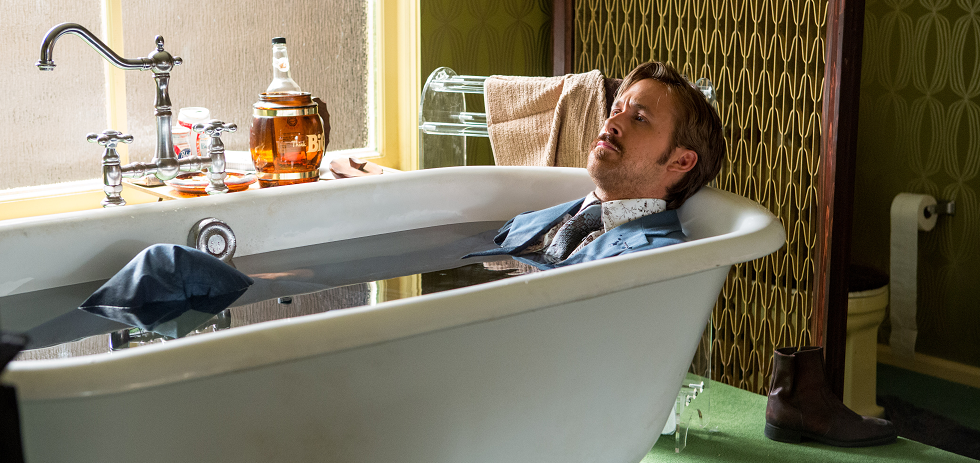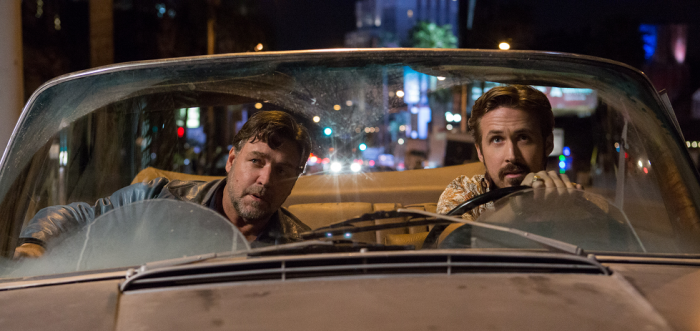
There’s a moment early in Shane Black’s The Nice Guys, after another set of physical gags segues into Abbott and Costello-esque dialogue, where you realise: this film’s a talkie. So joyful is it in its call-and-response, and so plentiful are its recurring jokes and motifs, that the film can’t avoid recalling that moment directly after the advent of sound where film seemed so enraptured by possibility.
The plot follows private detective Holland March (Ryan Gosling), whose skills extend only to fleecing the elderly through lazy per-day investigation rates, and Jackson Healy (Russell Crowe), an after-school special enforcer who beats up on creeps who pursue adolescent girls. Adversaries for the opening portion of the film, they are pushed together to solve an increasingly complicated case of a missing girl. Gosling sheds every layer of cool disaffection for a superb performance, playing a gleeful, clumsy, and above all else lucky idiot, and Crowe plays a similarly dumb straight man with similar success. Their chemistry really elevates the film, and their budding friendship recalls Riggs and Murtaugh, the central duo from the Black-penned Lethal Weapon, except with greater self awareness.
Most remarkable about the pair’s misadventure, though, is the high-quality physical comedy. Prior to this, I couldn’t name a recent film to truly land a physical gag—often, film removes the crashing immediacy which allows this brand of humor to excel when performed on-stage—but The Nice Guys hits again, and again, and again, ad nauseum. The verbal jokes land less, to the tune of about 50%, but there is not a single scene (or even a dialogue) without a joke, and the product of this is a film that either hits, or charms by trying to. Remarkably, many of the initially misfired lines find new form in callbacks or repeated motifs, and here we see how the writers find something truly funny by committing to establishing groundwork.
From its opening shot, The Nice Guys charms with an exuberant commitment to cutting, panning, and switching between perspectives, establishing the pertinent plot with no filler. Most charming is the narration: a mash-up of Crowe and Gosling’s competing voices, competing with one another with through increasingly absurd noir clichés. Similarly, the film’s screenplay comes from a place of deep trope literacy and awareness of form. A number of played-out narrative threads are chopped and changed in a constant attempt to defy expectation. This plays out in the opening few gags, which are laugh out loud funny, and again in the middle just when things seem primed to run out of steam.
There’s a symbiotic relationship between plot and comedy here, where the narrative is composed to enable the jokes; which in turn are used to propel the story. Typically in the action-comedy genre, the jokes exist in one place, while the plot is driven elsewhere (so often in the genre do characters stop laughing to do five minutes of ‘serious police work’, often leaving the audience behind as well, the later Lethal Weapons and the Rush Hour series being especially egregious in this regard). Instead, Black treats his protagonists as descendants of film’s great klutzes and, like The Three Stooges before them, problems find their resolutions in a tumble gag, only to find new problems by tumbling as well.

Black is an intuitive filmmaker, which is to say he effortlessly composes scenes without seeming strained or academic in his set-ups. The film’s colour palette evokes the candy-land promise wasted in fellow noir subverter Inherent Vice, and there’s further delight in the bizarre pans that establish each new locale, which feel ripped from the preamble to a Grand Theft Auto game, right when you’re most excited to start playing. His action scenes proceed naturally and charmingly towards a conclusion, and he’s a graduate from the Chekhov’s Gun school of ensuring all important things are established previously in the scene. Same too with narrative, as he cuts any lull or in-between moment to ensure a rocksteady pace — better still, he makes good decisions with the film’s logic, providing Ryan Gosling with the same armor Charlie Chaplin wore in every film, protecting him from all manner of physical distress so that he can keep joking through the fracas.
So often in these comedy-action hybrids, the rules of comedy are suspended for bouts of self-serious gunplay, and at no point does Black allow this. In a weaker film, this would seem like a weakness in the plot, but here it’s so innately justified by Black’s commitment to ensuring only the funny survive. The same coherence applies to character, as Black sets up characters with tendencies (be they towards cowardice or heroism), desires (money, purpose) and vices (alcohol) and then never lets it slip. Gosling is the same character from zero to one hundred, and the same applies to everyone else, so we never leave a scene feeling someone acted weirdly for the sake of narrative convenience.1
There are a few uninteresting beats throughout, where Crowe’s tendency to look awfully serious behind a gun require Gosling’s intervention, but these are rare, and entirely absent in the film’s opening half. The film’s middle proceeds slowly and has a few belly-up moments of seriousness, which are thankfully saved by Gosling. Black knows this too, limiting the scenes without Gosling, and trimming those dragging interludes that feature Jackson interacting with Holland’s daughter Holly (Angourie Rice). Similarly, the film has a strange political subtext about corruption in the auto industry, which aims in the right direction but suffers from the half-baked nature of the conceit (a similar issue as in Iron Man 3, though it’s less glaring here).2 It’s only here in which Black makes a play at the profound — he seems conscious of critics’ tendency to dismiss funny things as less deserving of critical praise, and while the film does not suffer for it, I mourn the unwritten jokes that could have taken its place.
Disclaimer: this is a film exclusively about two dumb men, and the comedy is commensurate with that. Similarly, its gender politics rest between questionable and willfully ignorant, and so your mileage may vary. Where The Nice Guys diverges from similar films is in its sincere commitment to comedy and refusal to bog itself down in tedious narrative or cringey character moments, and for this reason it transcends its genre. That said, the film casts a wider net than all others in its genre by treating its audience to a self-aware, charming enterprise that knows it’s only as good as its (very good) jokes.
Around the Staff
| Ian Barr | |
